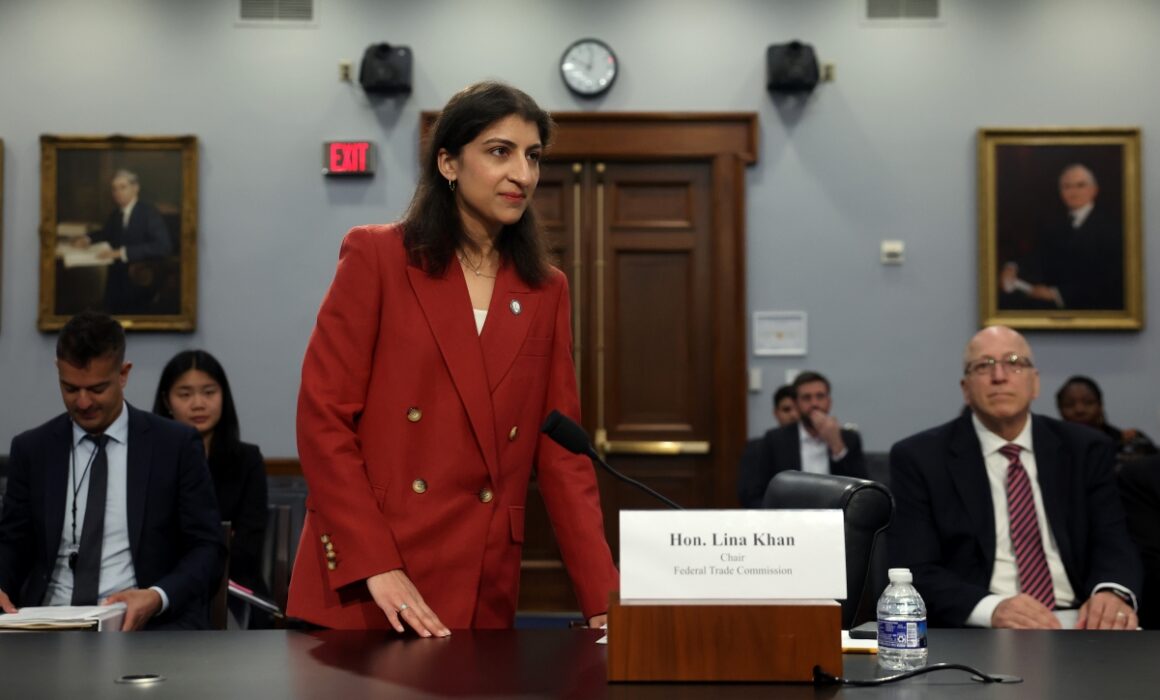A Pro-Competition Economic Agenda
May 17, 2024
And why this week’s China EV tariffs matter.
The Roosevelt Rundown features our top stories of the week.

Lina Khan, chair of the Federal Trade Commission (FTC), arrives to testify before the House Appropriations Subcommittee in May 2024. (Photo by Kevin Dietsch/Getty Images)
Doing More with Competition Policy
Signaling a shift away from neoliberal ideology, the government has increasingly focused on fostering more competitive markets as an approach to restructuring the economy. In a new brief, Bharat Ramamurti, former deputy director of the National Economic Council and former director of corporate power at Roosevelt, discusses what steps can be taken to go further and build on the successes of the last few years.
“Failure by the government to prioritize competition and antitrust policy in recent decades has harmed consumers, workers, and the American economy,” Ramamurti writes. That began to change as a result of the July 2021 Executive Order on Promoting Competition in the American Economy; since then, the government has made efforts to combat consolidation in the transportation sector, in health care, and in the labor market—including through the Federal Trade Commission’s recent rule banning noncompete clauses.
But there’s more that policymakers can do. Ramamurti outlines four ideas for improvement:
- Strengthen enforcement by funding the FTC and Department of Justice antitrust division, modifying antitrust laws, and nominating pro-competition judges;
- Institutionalize competition by ensuring a senior official at each government agency takes into account market competition concerns;
- Revise the tax code to force larger corporations to pay their fair share; and
- Promote competition in the fields of technology and artificial intelligence.
“A more robust federal government role in enforcing antitrust laws and in promoting competition across a variety of industries could help bring more innovation and dynamism to the American economy, along with lower prices for consumers and higher wages for workers,” Ramamurti writes.
Read the full brief: “A Pro-Competition Economic Agenda: How the Government Can Build on Recent Progress.”
A Foreign (Trade) Policy for the Middle Class
This week, in an effort to strengthen domestic industrial policy and clean energy supply chains, the US government announced 100 percent tariffs on electric vehicles imported from China. In a new blog post, Roosevelt’s Todd N. Tucker breaks down the administration’s invocation of Section 301 of the Trade Act of 1974 and what this means for the renewable energy transition.
“Climate change is a global problem, but its solution will necessarily come from national governments,” writes Tucker. “This means that each country’s national strategy needs to keep domestic workers and industries ‘whole’ during the green transition.”
The tariffs will help support the historic decarbonization investments outlined in the Inflation Reduction Act, Bipartisan Infrastructure Law, and CHIPS and Science Act, and protect workers making the US renewable energy transition happen. “Going forward, the US should build on today’s announcements by doing more to promote unions at firms that benefit from subsidies and trade protection,” Tucker writes.
Read more in “Why This Matters: Section 301 Tariffs on Electric Vehicles.”
What We’re Talking About
The marginal costs for many groceries have actually *decreased*—but those lower costs haven't been passed down to consumers.
Instead, corporations are taking advantage of their outsized market power & ⬆️ markups. @DrAliBustamante responds to @SenWarren ⬇️ https://t.co/PBZexnp5H1
— Roosevelt Institute (@rooseveltinst) May 14, 2024
What We’re Reading
Why More Moms Are Working and Child Care Jobs Are Going Up – feat. Roosevelt’s Suzanne Kahn – Vox
Billionaire Blockholders Are Stifling Competition in Corporate America – by Roosevelt’s Niko Lusiani – ProMarket
Why Biden Doesn’t Want Americans Buying Cheap Chinese EVs – feat. the Roosevelt Institute – Axios

